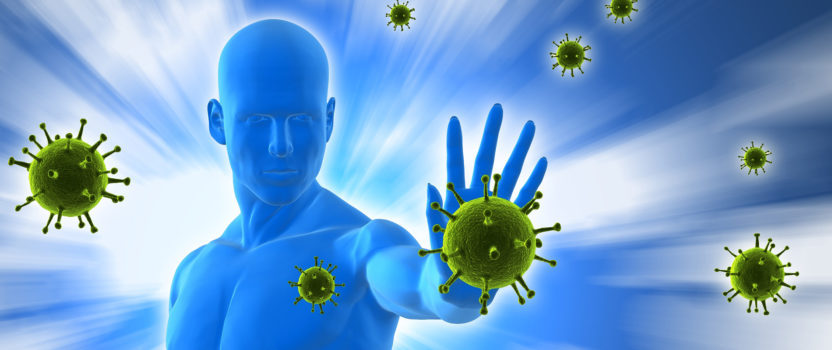Strengthen your Immunity this Cold and Flu Season
Everyday we inhale and swallow thousands of bacteria and viruses. Luckily for us our immune system is there to help protect us from these pathogens. Supporting and enhancing your immune system is one of the most important things you can do to increase your resistance to disease and reduce your susceptibility to seasonal colds, flus and even cancer.
Our immune system does a great job – most of the time.
But sometimes our immune system falters and we get sick. It often happens during the change of seasons or periods of intense activity and fatigue. Learning how to boost the immune system is one of the most complex questions of human biology. But although research has not yet discovered all mysteries of how it works, some remedies have already proved their effectiveness in supporting our natural defenses.
Our immune system shields us against infections and more.
The immune system is complex because it involves many organs, cells and different substances. The skin and mucous membranes are the first natural barriers against external aggressors. Our skin offers an environment hostile to germs because its surface is slightly acidic and quite dry and it’s covered “good” bacteria.The mouth, eyes, ears, nose, intestines, urinary and genital tracts are much more vulnerable areas because they offer a relatively easy route of passage for microbes. However, these routes also have their protection system. For example, diarrhea along with the coughing and sneezing reflexes expel digestive and respiratory microorganisms.
The immune reaction
When a pathogen manages to overcome the barrier of your skin, your immune system goes on alert:
It triggers an inflammatory response, whose function it is to inactivate the aggressors and repair tissue damage. Inflammation also sends us signals, through pain, redness and swelling that let us know that something is wrong. Fever is another defense mechanism that is sometimes present in the early stages of infection. Its role is to accelerate immune reactions. Cells combat disease more effectively at a slightly higher temperature than normal and some microbes die off due to this increase in temperature, thus accelerating the body’s defense. White blood cells, known as lymphocytes, also play a vital role in fighting infections. When a foreign body gets into your body, B cells begin to produce antibodies that attach themselves to the foreign invader and target it for destruction. T cells are responsible for directly destroying cells that are infected by viruses and abnormal, cancerous cells. It is therefore essential to support their activity so as to strengthen your immune response.
Why are some people more resistant to infection than others?
Those who suffer from chronic or serious illness and the elderly generally have immune systems that respond more slowly and less effectively to infections. But even among middle-aged and healthy adults, there are many differences between those who are less susceptible or never sick and others who seem to ‘catch whatever is going around”.
The reasons why some people have weaker immune systems is based on different risk factors that include:
- The amount of muscle mass – muscle proteins provide the raw materials used by the immune system to produce lymphocytes, along with the all-important natural killer cells.
- Vitamin D levels in the blood – this vitamin is necessary for the production of very powerful antimicrobial substances and plays a vital role in cell division and in regulating hundreds of genes in our body. A deficiency makes us more prone to heart disease, respiratory illness, autoimmune diseases and cancer.
- Imbalances in thyroid hormones. Thyroid issues are known to weaken the immune system.
Other factors may also contribute to a weaker immune system:
People who are generally in good health but who tend to suffer frequently from various infections (colds, flus, gastroenteritis, urinary tract infections, otitis etc) will first need to address their lifestyle habits in order to effectively reinforce their defenses. This includes the following:
- Negative lifestyle factors – lack of sleep, lack of exercise, poor hygiene, the abuse of tobacco, drugs and alcohol.
- Eating habits – lack of variety, over-eating and malnourishment.
- Chronic stress – produces hormones that break down body tissue.
- Exposure to pollutants – pollution, medications, food additives and all kinds of chemicals tax the immune system.
- Psychological and emotional state – those with depression have considerably weakened immune systems.
In addition, when the body is faced with a change of season (especially the arrival of autumn) or a period of overwork, depression or anxiety, it may be useful to start an actively strengthening of the immune system.
Improving the immune response – naturally
But how often do we think about looking after our immune system? Most people know it is a good idea to take a vitamin C supplement and drink more orange juice when we have a cold, but that’s about it. Understanding exactly how the immune system works might be complicated, but learning the basics and finding out how nutrition can help or hinder your immunity is important if we want to protect out health.
Do you want to know more about beating colds and flu naturally? Would you like to decrease your allergic reactions, protect yourself against degenerative diseases and generally increase your immunity? We can help us maintain your immune system in peak condition and keep you feeling great and free from illness. Start your ‘Immune Boost Plan’ now at: https://www.foodwise.life/program/immune-boost


Leave a Reply
Your email is safe with us.
You must be logged in to post a comment.